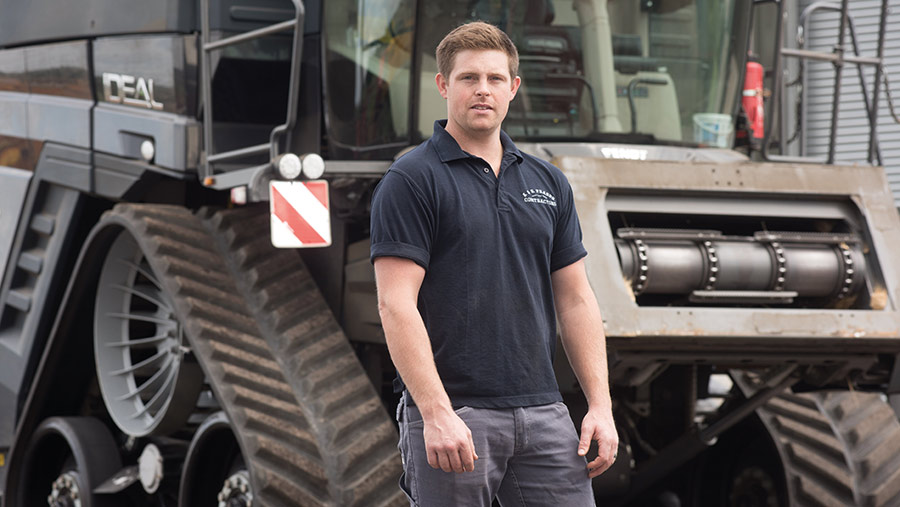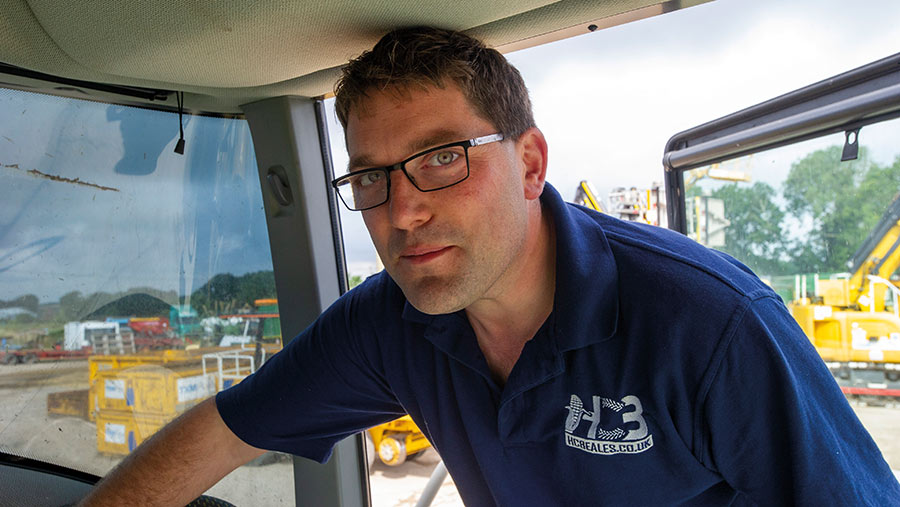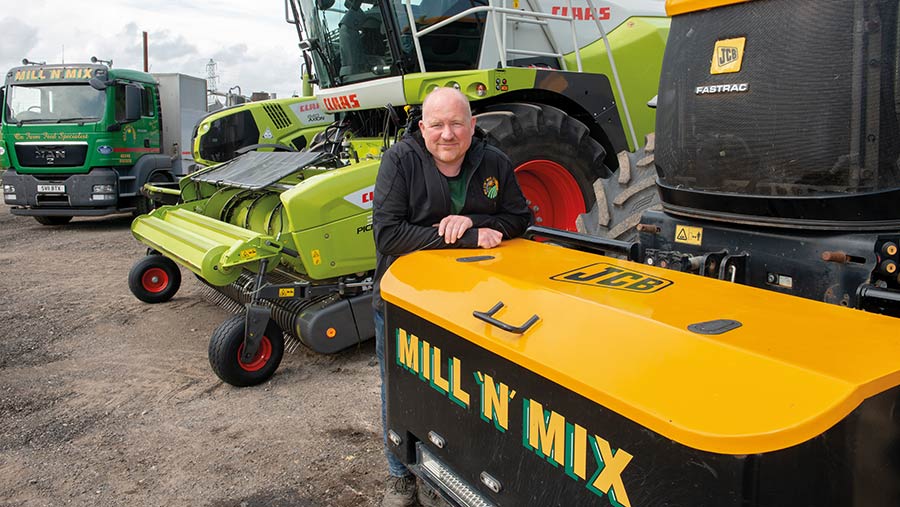Farmers Weekly Awards: 2021 Contractor of the Year finalists

This year’s Contractor of the Year finalists may be separated by hundreds of miles and operate in different markets, but they all share three key qualities – innovation, enthusiasm and determination.
See also: What’s in Your Shed? visits Contractor of the Year Tim Russon
The finalists
- A&R Fraser Contracting
Braeside Farm, Shaftesbury, Dorset - HC Beales Agricultural Contracting
Crown Farm, Great Ellingham, Norfolk - Mill ‘n’ Mix
Dochcarty Road, Dingwall, Ross-shire
The judges
- Tim Russon
Last year’s winner - Oliver Mark
Farmers Weekly machinery editor - Jill Hewitt
Independent judge
A&R Fraser Contracting
Braeside Farm, Shaftesbury, Dorset

George Fraser © Hugh Knutt
George and Jonny Fraser, along with their parents, Andrew and Rosalind, have transformed their regular contracting outfit into one that specialises in direct-drilling, cover-cropping and reducing inputs.
Committing wholeheartedly to such an approach may seem counter-intuitive for a farm contractor, where more field passes give more opportunities to earn money, but demand for their services has never been higher, machinery costs are lower, and the soil they work is far healthier, too.
The brothers, who returned to the family farm and contracting business 15 years ago, have become local experts in the world of regen ag, and have used their home farm to demonstrate what they’ve learned and what can be achieved by paring back a traditional tillage regime.
Their aim is to reduce chemical and fertiliser inputs and improve the condition of the soil to deliver better yields for their customers.
To do this, they help organise full soil assessments for each customer’s fields, including a structural assessment, worm count and analysis of major, secondary and micronutrients.
As well as forming a benchmark for future evaluations, it helps the team tailor a strategy for each field in a bid to improve performance – whether it be through sowing specific cover or catch crops, targeted subsoiling, reduced tillage or muck applications.
Such has been the demand for this approach that 60% of A&R Fraser’s contract-farmed and stubble-to-stubble arable agreements are now managed on a no-till basis.
And it’s paying dividends, with oilseed rape yields of more than 4t/ha, winter wheat peaking at 12.5t/ha and 12t/ha winter barley crops, which the brothers attribute to cover-cropping, minimal soil disturbance and well-timed slurry applications.
Machinery
The shift in focus from traditional establishment methods to no-till required a rethink on the machinery policy – out went the twin-track Challenger and soil-stirring Vaderstad implements, replaced by wheeled tractors and direct drills.
Running both a disc-based Weaving GD and a tine-based Amazone Cayena direct drill provides the flexibility to suit different soil types and cropping plans, and they also have a Weaving IR to sow grass in maize.
This recent addition came as a result of trials conducted with Wessex Water to assess run-off and leaching in a catchment sensitive area. The benefits of the system have been well documented, and the Frasers expect it to become a permanent fixture in their business.
Frontline kit comes new or ex-demo and, if possible, with an extended warranty. However, Jonny prices equipment regularly to find the financial sweet spot and minimise depreciation costs.
Comparatively, some kit stays for the long haul, such as the five-year-old GD drill, which has just been treated to a major service with new bearings and discs all round.
The family have also invested heavily in infrastructure, including a new machinery shed, workshop, chemical spray store and two grain stores with 4,000t storage capacity.
Staff and customers
With 125 customers to keep happy across Wiltshire, Dorset, Hampshire and Somerset, the Frasers prioritise a prompt service over profit.
This includes showing new customers the relevant research and trials data to justify their plans and having open dialogue about how it can be adapted to suit them.
The eight full-time staff members tend to be recruited locally and so have an appreciation of the local community.
Large equipment is moved early in the morning, built-up areas are avoided where possible and, given the Frasers have been farming in the area for five generations, they engage positively with the local community.
The judges said
Brothers George and Jonny are future-proofing their family contracting business. By specialising in no-till and guiding their customers through the transition to regenerative farming methods, they are perfectly positioned to thrive in the new age of environmentally sensitive agriculture.”
Summary
The judges liked
- Developed a specialist arable business based on regenerative agriculture
- Helps customers make the transition from intensive cultivations
- Keen interest in agronomy to improve the performance of customers’ crops
- Actively involved in crop and machinery trials
- Committed to sustainable agriculture
Farm facts
- Services offered: Muck and slurry application, grass harvesting, drilling, combining, spraying
- Main customer base: Contract farming and stubble-to-stubble contracts, arable, beef, dairy and pig farms
- Area covered: 125 customers in Wiltshire, Dorset, Hampshire and Somerset
The numbers
- 8 full-time members of staff
- 60% of contract arable work no-till
- 800ha OSR drilling/year
- 4,000t grain store capacity
- 125 customers
HC Beales Agricultural Contracting
Crown Farm, Great Ellingham, Norfolk

Charles Saffell © Jason Bye
HC Beales has been growing at breakneck speed under the guidance of Charles Saffell and his wife, Lorie, who have picked up big contracts to feed four anaerobic digestion (AD) plants with over 3,000ha of maize.
By his own admission, the expansion from a 600ha arable farm and sideline contracting operation to maize-harvesting specialist has been a calculated risk, but one that he hopes will put the business on a sound footing for generations to come.
Supply of maize and rye for four hungry anaerobic digesters means the company now runs two of its own foragers and the service dominates 75% of HC Beales’ workload.
And it has also seen the company’s staff numbers swell from three to almost 30 during the height of the maize harvest.
But such a growth trajectory isn’t sustainable, and Charles now aims to consolidate the business, having secured long-term contracts for both feedstock supply and digestate spreading.
Machinery
Though the expansion of the company has required heavy investment in the machinery fleet, Charles is keen not to allow costs to spiral out of control.
With that in mind, he employs a mechanic on a 24-hour call-out during busy periods to take care of maintenance and repairs.
This minimises downtime, and means the business can afford to carry frontline machines outside of their warranty period to maximise value.
The Claas Lexion combine is now nine years old and the Jaguar foragers, running Greenstar guidance, have five years under their belts – with the hope of getting three more years from them following a major overhaul.
Unusually, HC Beales has a mixed-brand fleet of nine tractors on its books, which includes five John Deeres, JCB Fastracs, a Fendt and a Claas, covering a power range of 155-410hp.
Most stay for a minimum of five years, by which time many will have tallied between 8,000 and 10,000 hours.
Decisions on replacements are based on maintenance and repair costs, their market values and depreciation.
Implements are a mix of new, ex-demo and second-hand depending on their job and expected output. British manufacturers such as Bateman, Bailey and JCB are favoured where possible, provided reliability, dealer back-up and available technology is all competitive.
Farmplan Business Manager allows costs to be allocated to each enterprise, making it easier to target more profitable operations.
One of the shrewdest investments so far has turned out to be a Weaving IR drill, which has delivered a return after just a year’s work sowing grass between maize rows.
Staff and customers
Managing a team of 10 that swells to up to 30 isn’t without its challenges, but the company does all it can to prepare its employees for work.
Staff are given harvest packs and risk assessments, which are signed before work commences, and they are asked to complete daily machinery check sheets that help to identify any problems to be fixed in the workshop.
Operators are also provided with maps of the area that detail field gateways, overhead power lines and haulage route plans to minimise the effect on the local community, plus trailers are given reference numbers to help manage and investigate any complaints.
To keep the team running smoothly, forager drivers are assigned team leader status, charged with organising the gang and conducting regular visual risk assessments.
They also liaise directly with customers, taking some of the management burden off Charles.
The judges say:
Charles has supercharged the family-run farm, with his carefully considered but rapid expansion turning it into an AD specialist and one of Norfolk’s biggest contracting businesses.”
Summary
The judges liked
- Long-term AD contracts maintain stable business
- Harvest packs provide operators with maps and safety information
- Employ forager drivers to manage the team and communicate with customers
- Keeps machinery longer to extract maximum value
- Full-time mechanic minimises servicing and maintenance costs
Farm facts
- Services offered: Drilling, spraying, cultivations, combining, grass/wholecrop/maize harvesting, haulage
- Main customer base: AD plants, beef, dairy and arable farms
- Area covered: 50 customers across Norfolk and north Suffolk
The numbers
- 10 full-time members of staff
- 20 part-timers during harvest
- 3,000ha maize harvested/year
- 9 tractors in the fleet
- 50 customers
Mill ‘n’ Mix
Dochcarty Road, Dingwall, Ross-shire

John Fraser © Angus Findlay
The longevity of the Fraser family’s business is a testament to the reputation Robert and John have built among their customers across the north of Scotland.
Having started out in 1982, Mill ‘n’ Mix now employs a team of seven and, as a relatively small outfit competing against large corporate feed companies, John’s priority is to build and maintain close relationships with his customers. That means delivering as promised, when promised.
The 10,000t/year animal feed production operation centres around two mobile Feedwagons with bespoke weighing systems that were designed and manufactured in-house in 2010.
These have helped to double capacity, increase profits and reduce the business’ carbon footprint.
However, Mill ‘n’ Mix isn’t a standard milling contractor, as it also runs a forage harvesting team covering more than 2,000ha/year and has a large agricultural engineering workshop.
This versatility, adaptability and willingness to take on new opportunities has helped establish a year-round workload that keeps staff and machinery busy.
Christmas tree harvesting occupies tractors and trailers from mid-October to mid-December, before the focus shifts to carting farmyard manure through to April – by which point the team starts to think about the silage season.
Machinery
The firm’s flagship machines are the two mobile feed mills, which were manufactured in its own engineering department.
One is mounted on a MAN TGS 360 truck and the other on a purpose-built trailer chassis pulled by a Fastrac 8310. They travel up to 60 miles from the business’ base in Dingwall.
John keeps a keen eye on business costs – in particular, machinery, diesel and insurance – and sets prices based on local and national averages, his past experience and information from completed job sheet data.
The same applies to equipment choices, with fuel economy, running costs and performance key factors to consider in selecting the most suitable machine for the job.
In the case of the foraging team, that’s a Claas Jaguar 970 complete with telematics, yield mapping and dry matter sensors, providing both John and his customers with key insights into the performance of both crops and machine.
Also among the fleet are two JCB 435 loading shovels and Claas and JCB tractors.
And because there’s a big workshop at the yard, all servicing and repairs can be carried out by in-house mechanics, slashing labour costs on big jobs and meaning that warranty is a bonus rather than a deal-breaker in any new equipment negotiations.
There’s no set replacement policy, with John instead preferring to monitor reliability and residual values, which tend to be kept relatively high thanks to meticulous maintenance regimes.
Staff and customers
Customers are at the heart of the Mill ‘n’ Mix business, and John values his strong relationships with them – some of whom have been on the books for 35 years.
He visits them in person to tailor services and payment plans to their needs, and listens to their opinions in an effort to be as genuine and approachable as possible.
The firm’s seven full-time staff are also highly valued and encouraged to complete courses and qualifications. They are given employment policies and hired-in contractors are issued safety letters to make them aware of any risks.
The judges say
Gradual expansion and diversification of John Fraser’s Mill ‘n’ Mix business has improved profits and helped get more from investments in staff and machinery. Strong customer relationships have been central to the success, where quality is prioritised over quantity.”
Summary
The judges liked
- Sustainable business growth
- Prioritises strong customer relationships over rapid expansion
- Mix of services dovetail to get the most from staff and machinery year-round
- Good workshop helps keep on top of machinery servicing and maintenance costs
- Open-minded approach to new opportunities
Farm facts
- Services offered: Bruising, milling, mixing, forage harvesting, muckspreading, ag engineering, general farm contracting
- Main customer base: Livestock and dairy farms
- Area covered: 429 customers across a 60-mile radius from Dingwall, Ross-shire
The numbers
- 7 Members of staff
- 10,000t Animal feed/year
- 2,000ha Forage harvesting/year
- 2 mobile Milling machines
- 1982 Year the business started
Sponsor’s message

“Agricultural contractors are constantly overcoming challenges and adapting to the changing farming landscape to provide their customers with access to specialist machinery, skilled operators and efficient services. This year’s finalists demonstrate the qualities required to succeed in the business.”
Pippa Piotrowicz, Merit Ag Check team leader

